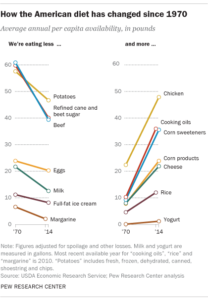How Much Meat Should We Really Eat?
It’s barbecue season but there’s another reason that meat lovers might be rejoicing. In case you were unaware, new nutrition recommendations released last fall by an international group of researchers gave us more or less the green light to eat red and processed meat.
The guidelines do not replace current recommendations but could be used to determine future dietary guidelines. And they came as quite a surprise, considering we have been warned for years that consuming red and processed meat is a surefire path to heart disease, cancer or other chronic diseases. So, the prospect that we can now eat a bacon cheeseburger guilt-free is borderline revolutionary.
We are accustomed to dietary recommendations encouraging us to eat more fruits and vegetables while cutting back on less healthy fare like added sugar, salt and of course, meat.
The USDA develops the dietary guidelines to advise individuals about what a healthy diet that meets all our nutrient needs should consist of. Revised every five years, the 2020 guidelines have yet to be released so it remains unclear if or how they will be influenced by the panel’s recommendation. Currently the guidelines do not include any specific recommendations to limit consumption of red or processed meat other than to encourage “a variety of protein foods.”
Let’s be clear, nutrition is a relatively new science which means we are constantly having to update recommendations based on different studies. (Just think how many times we’ve flip-flopped on eggs and cholesterol!) That being said, over the years we have been able to establish plenty of evidence-based recommendations with solid scientific backing. And we thought the connection between eating red and processed meat and increased risk for chronic disease was one of them. Or is it?
AN IMPRECISE SCIENCE
After researchers reviewed evidence from prior studies, they concluded that although individuals shouldn’t increase their consumption, there was no strong evidence to support that decreasing our intake would likewise decrease our odds of developing heart disease, cancer or diabetes. The researchers’ takeaway was basically, if we keep doing what we’re doing then we’ll probably be just fine. Say what?!
To have a panel of well-respected medical professionals do a total one-eighty on such a widely established “fact” (the American Heart Association, the American Institute for Cancer Research and other public health experts have long warned that the consumption of red and processed meat is harmful to your health) shook the nutrition world to its core and rightfully so. Critics in the medical community went so far as to accuse the panel of violating the Hippocratic oath of “do no harm” by making such a claim.
“This is a very irresponsible public health recommendation,” said Dr. Frank Hu, who chairs the nutrition department at the Harvard T.H. Chan School of Public Health told CNN.
The new recommendation was based on five reviews of more than 100 studies, analyzing not only the results, but the quality of the studies as well. Upon review, the researchers found that on average, Americans eat red or processed meat two to four times per week and that reducing consumption resulted in an 8 percent lower risk of heart disease, cancer and premature death. This information was nothing new, but their interpretation of it was. First up, the panel concluded that the actual reduction in health risk was relatively small.
Secondly, they concluded that most of the studies failed to find a direct cause-and-effect relationship between chronic disease and higher consumption of red and processed meat. Essentially, they believed that other foods and beverages that meat-eaters happened to be consuming (e.g. a side of French fries with their burger) could just as easily explain their negative health outcomes.
It may be impossible to establish causality when conducting observational studies, but when it comes to nutrition that is the best method available. Unlike clinical drug trials, nutrition is far more complex and thus not as easily controlled or manipulated to test a hypothesis. It would be impractical and unethical to require a group of people to eat red meat every day for 20 years to see if they developed heart disease, so we must rely on different methodology. Longitudinal observational studies can only show associations and it is up to us to interpret these outcomes.
 BUT WE LIKE MEAT, RIGHT?
BUT WE LIKE MEAT, RIGHT?
Another major factor in the panel’s recommendation was the unwillingness of individuals to change their eating habits. One component of the review examined dietary preferences and attitudes towards red and processed meat.
Surprise: the majority of Americans like to eat meat and have no intention of changing their habits. Critics have slammed the panel for factoring this into their recommendation, questioning why they would let dietary guidelines be influenced by taste preference. Imagine if the government hadn’t required putting warnings on cigarettes simply because people liked to smoke!
An important consideration when evaluating the validity of this study is the failure to account for the health benefits of replacing red and processed meat with plant protein. It is one thing to simply omit meat or substitute other highly-processed foods. It’s something quite different to replace animal protein with a healthy non-animal protein source such as beans.
Studies certainly confirm the benefits of a plant-based diet (see our August, 2019 issue for more information) so perhaps the true health benefit of curtailing our meat consumption is derived less from what we aren’t eating and more from what we are. For example, studies support that replacing saturated fat, which tends to be high in meat, with unsaturated fats reduces the risk of heart disease.
When it comes to cancer risk, there is particular concern about processed meats. As recently as 2015, the World Health Organization classified processed meat as a group one carcinogen, declaring that daily consumption of processed meat increased the risk of colon cancer by 18%. Additionally, they classified red meat as “probably carcinogenic to humans.” Notwithstanding this, the panel did not distinguish between red meat and processed meat thereby further calling into question their ability to reach the conclusions that they did.
A GREEN LIGHT FOR BURGERS?
Perhaps most concerning is the spin the media has put on the panel’s recommendations. While the panel felt they lacked the evidence to recommend decreasing consumption of red and processed meat, they certainly did not condone eating more. Yet when the media got hold of the findings, they were quick to make it sound like a free pass to dine on bacon-wrapped hot dogs without fear of any health repercussions.
However, the intended message was that if individuals are currently consuming a few servings of red meat and processed food per week then cutting down won’t likely infer a tremendous health benefit. Not exactly the same thing.
Just as with any controversial topic, the debate was and is far from over. In fact, another study published in February in JAMA Internal Medicine refuted the red meat “hall pass,” concluding that consuming two or more servings of red meat, processed meat or poultry increases risk for developing cardiovascular disease. Those who consumed the most had the highest risk, supporting the recommendation to cut down on these foods.
Unlike the October study, this study also examined the potential health risks of consuming poultry and seafood. Although there was a very small association between poultry and increased risk for developing heart disease, researchers deemed it too insignificant to recommend avoiding white meat. Additionally, seafood was given the all-clear and encouraged as a substitute for meat along with plant-based options.
Now keep in mind recommendations are simply that; recommendations. Genetics, environment, physical activity, stress, lifestyle and countless other aspects of our diet—other than just meat consumption—factor into our health and longevity. We still have a lot to learn about the connection between diet and health, but for now it seems that our old advice rings true; eat plenty of fruits, vegetables, whole grains, lean proteins and healthy fats.
And a burger every now and then won’t kill you…we hope.
The Director of Nutrition at The Edge in South Burlington, Jamie Sheahan holds a M.S. in Dietetics from the University of Vermont, where she serves as an adjunct professor of sports nutrition. Jamie has run over 40 marathons and several ultra marathons.

